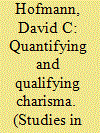|
|
|
Sort Order |
|
|
|
Items / Page
|
|
|
|
|
|
|
| Srl | Item |
| 1 |
ID:
175746


|
|
|
|
|
| Summary/Abstract |
Despite a pervasive concern among law enforcement and security agencies, there are relatively few academic explorations of the likelihood of violence associated with anti-authority activists from groups such as the Freemen-on-the-Land, Sovereign Citizens, and similar movements within Canada. In order to begin addressing this gap in knowledge, this article uses a multi-method approach to explore and assess the potential for violence by the Canadian anti-authority community against the state in particular. Data were gathered from interviews with law enforcement, lawyers, judges, notaries, and movement adherents (n = 32), as well as from the analysis of open source data which included media reports, court documents, and movement websites. Results suggest that there are three distinct classes of violent activity, directed specifically at the state and state actors, that are prevalent among Canadian anti-authority movements: a) offensive/extremist violence; b) defensive/reactionary violence; and c) harassment and intimidation. The article concludes with a discussion of two emerging areas of concern related to Canadian anti-authority violence and responses to the anti-authority community in Canada.
|
|
|
|
|
|
|
|
|
|
|
|
|
|
|
|
| 2 |
ID:
172820


|
|
|
|
|
| Summary/Abstract |
Conventional knowledge and early academic work on lone-actor terrorists has popularized the concept that they radicalize, operate, plan, and execute plots in relative anonymity, with little connection to formal or more organized terrorist groups and networks. However, recent scholarship has increasingly challenged the notion of the “loneliness” of lone-actors. In order to further empirically test this notion, this article uses social network analysis to examine the ideological, signaling, and support networks of two case studies of lone-actors during the twenty-four months prior to the commission of their first act of terrorist violence.
|
|
|
|
|
|
|
|
|
|
|
|
|
|
|
|
| 3 |
ID:
132177


|
|
|
|
|
| Publication |
2014.
|
| Summary/Abstract |
Recent scholarship has called for additional research into the role of charismatic authority in terrorist groups and the process of radicalization. However, the sociological concepts of charisma and charismatic authority are being widely misused in terrorism studies. Current radicalization research often indirectly flirts with core concepts of charismatic authority, but fails to properly tap into its analytical utility. This article proposes to begin addressing this gap in knowledge in three ways, with: (1) a synthesis of social scientific research on charismatic authority, (2) a critical analysis of how charismatic authority is being misused and overlooked in the terrorist radicalization literature, and (3) an exploration of challenges and opportunities for future research concerning charismatic authority and terrorist radicalization.
|
|
|
|
|
|
|
|
|
|
|
|
|
|
|
|
| 4 |
ID:
140779


|
|
|
|
|
| Summary/Abstract |
In the past four decades, there has been increased multidisciplinary scholarly interest in the study of charismatic authority. However, there has yet to be any systematic examination of charismatic authority in the context of terrorism, despite widespread acknowledgment of the importance of charismatic leaders in the recruitment, radicalization, and operation of terrorist groups. This article seeks to contribute to future empirical research by presenting a theoretical framework for measuring the presence of charismatic authority in terrorist groups that is based on Max Weber's seminal work on legitimate domination (herrschaft) and on theoretical insights drawn from the study of charismatic authority in new religious movements. The framework is then applied to an illustrative case study of the relationship between charismatic authority and the radicalization process within the far-right terrorist group “the Covenant, the Sword, and the Arm of the Lord.” The article concludes with a discussion of findings and suggestions for future research.
|
|
|
|
|
|
|
|
|
|
|
|
|
|
|
|
|
|
|
|
|